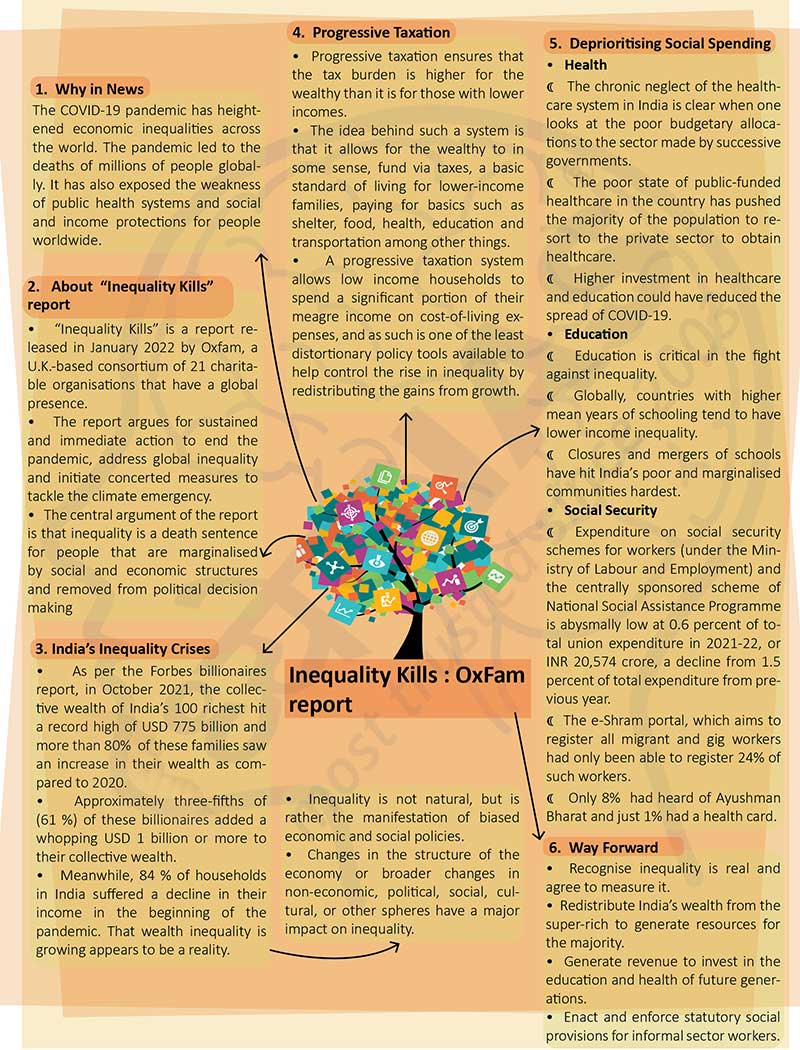Brain-booster
/
29 Mar 2022
Brain Booster for UPSC & State PCS Examination (Topic: Inequality Kills : OxFam Report)

Why in News?
- The COVID-19 pandemic has heightened economic inequalities across the
world. The pandemic led to the deaths of millions of people globally. It has
also exposed the weakness of public health systems and social and income
protections for people worldwide.
About “Inequality Kills” report
- “Inequality Kills” is a report released in January 2022 by Oxfam, a
U.K.-based consortium of 21 charitable organisations that have a global
presence.
- The report argues for sustained and immediate action to end the
pandemic, address global inequality and initiate concerted measures to
tackle the climate emergency.
- The central argument of the report is that inequality is a death
sentence for people that are marginalised by social and economic structures
and removed from political decision making.
India’s Inequality Crises
- As per the Forbes billionaires report, in October 2021, the collective
wealth of India’s 100 richest hit a record high of USD 775 billion and more
than 80% of these families saw an increase in their wealth as compared to
2020.
- Approximately three-fifths of (61 %) of these billionaires added a
whopping USD 1 billion or more to their collective wealth.
- Meanwhile, 84 % of households in India suffered a decline in their
income in the beginning of the pandemic. That wealth inequality is growing
appears to be a reality.
- Inequality is not natural, but is rather the manifestation of biased
economic and social policies.
- Changes in the structure of the economy or broader changes in
non-economic, political, social, cultural, or other spheres have a major
impact on inequality.
Progressive Taxation
- Progressive taxation ensures that the tax burden is higher for the
wealthy than it is for those with lower incomes.
- The idea behind such a system is that it allows for the wealthy to in
some sense, fund via taxes, a basic standard of living for lower-income
families, paying for basics such as shelter, food, health, education and
transportation among other things.
- A progressive taxation system allows low income households to spend a
significant portion of their meagre income on cost-of-living expenses, and
as such is one of the least distortionary policy tools available to help
control the rise in inequality by redistributing the gains from growth.
Deprioritising Social Spending
Health
- The chronic neglect of the healthcare system in India is clear when one
looks at the poor budgetary allocations to the sector made by successive
governments.
- The poor state of public-funded healthcare in the country has pushed the
majority of the population to resort to the private sector to obtain
healthcare.
- Higher investment in healthcare and education could have reduced the
spread of COVID-19.
Education
- Education is critical in the fight against inequality.
- Globally, countries with higher mean years of schooling tend to have
lower income inequality.
- Closures and mergers of schools have hit India’s poor and marginalised
communities hardest.
Social Security
- Expenditure on social security schemes for workers (under the Ministry
of Labour and Employment) and the centrally sponsored scheme of National
Social Assistance Programme is abysmally low at 0.6 percent of total union
expenditure in 2021-22, or INR 20,574 crore, a decline from 1.5 percent of
total expenditure from previous year.
- The e-Shram portal, which aims to register all migrant and gig workers
had only been able to register 24% of such workers.
- Only 8% had heard of Ayushman Bharat and just 1% had a health card.
Way Forward
- Recognise inequality is real and agree to measure it.
- Redistribute India’s wealth from the super-rich to generate resources
for the majority.
- Generate revenue to invest in the education and health of future
generations.
- Enact and enforce statutory social provisions for informal sector
workers.







